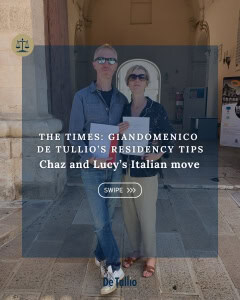Understanding Trusts in Italy: A Legal Mechanism for Asset Management
A trust is a legal institution designed to separate certain assets from an individual’s personal holdings. This separation allows these assets to be entrusted to a trustee for a specific purpose, often in the interest of a beneficiary or to achieve a particular goal. Originating in Anglo-Saxon legal systems, trusts in Italy have significant differences compared to other legal frameworks. However, they gained recognition in Italy on January 1, 1992, with the ratification of the “Convention on the Law Applicable to Trusts and their Recognition,” adopted in The Hague on July 1, 1985 (law of October 16, 1989, no. 364).
To discuss your situation, get in touch for a free consultation, or click here to get all our FREE guides for foreigners planning to renoveting, buy, sell or live in Italy.
Components of Trusts in Italy: Roles and Responsibilities
In a trust arrangement, three primary entities play crucial roles: the “settlor,” the “trustee,” and the “beneficiary.”
Settlor:
The settlor initiates the trust through a unilateral act, establishing its terms and conditions.
Trustee:
Often referred to as the “trustee,” this individual or entity receives the assets, assumes ownership, and manages them in the best interest of the beneficiaries.
Beneficiary:
The settlor designates the beneficiary who receives benefits from the trust’s assets as “income beneficiaries,” or ultimately inherits the assets as “capital beneficiaries” or “ultimate beneficiaries.”
The settlor or a third party names beneficiaries in the initial trust document or identifies them later. A settlor may specify a beneficiary by name or as belonging to a particular category. In some cases, settlors establish trusts without specific beneficiaries, known as “purpose trusts”. Settlors create these trusts to achieve specific charitable objectives.
Furthermore, a “protector” commonly oversees the trustee’s actions. The trust deed may require the protector to authorize certain trustee actions.
Safeguarding Assets: The Protective Role of Italian Trusts
In a trust arrangement, the segregation of assets shields them from potential creditor claims against the settlor, beneficiary, or trustee. By design, these assets become distinct from personal holdings, safeguarding them from individual financial liabilities. Only creditors specifically related to the trust can make claims against these assets.
Asset Protection and Trust Validity:
It’s crucial to understand that asset segregation is a consequence, not the primary purpose, of establishing a trust.
A valid trust must serve a recognized purpose deemed worthy of legal protection. Establishing a trust solely for asset protection reasons, without a legitimate purpose, does not meet the requirements for validity in the Italian legal system.
Trusts in Italy: Evolution of Legal Recognition
In recent years, Italy has witnessed various attempts to establish trusts solely for the purpose of shielding assets from creditors or gaining undue tax advantages. However, such trusts faced legal challenges, with numerous court rulings, including those from the Italian Supreme Court, declaring these trusts null and void or ineffective against creditors and tax authorities.
Consequently, a sense of skepticism toward trusts emerged within the Italian legal framework, viewing them as tools for evading debts or taxes.
The landscape shifted on January 1, 2017, with the enactment of Law no. 112 of June 22, 2016. This legislation expressly validated asset separation within trusts, marking a pivotal moment in the legal recognition of trusts in Italy.
Beyond its primary objective of enhancing assistance, care, and protection for individuals with severe disabilities, this law actively encourages trust establishment. Its explicit endorsement of trusts extends beyond its specific focus, dispelling any uncertainties regarding the legitimacy of this instrument within the Italian legal system.
Legal Considerations for Trusts in Italy
Despite the growing recognition of trusts in Italy, a specific regulatory framework within Italian legislation is still absent. Consequently, reliance on foreign laws becomes necessary for trust governance. The choice of applicable law holds significant implications for the functionality and validity of trusts in Italy.
Purposeful Establishment of Trusts
Understanding that trusts can only serve specific purposes, not shield assets from creditors, is vital. While asset separation naturally results from establishing a trust, it cannot solely motivate trust creation, nor can it defraud creditors or tax authorities.
Prospective trust settlors in Italy must carefully consider both the chosen law’s provisions and jurisprudence, along with the rules outlined in the Hague Convention of July 1, 1985. Additionally, they must ensure that the trust’s constitutive clauses align with Italian public order and tax regulations.
This scrutiny extends beyond trust regulation to assess the validity of the trust’s constitutive act itself, emphasizing the importance of thorough legal examination and compliance.
Deciphering Sham Trusts: Legal Implications and Standards
In the realm of trust regulation, the concept of a sham trust has evolved to tackle situations where the settlor maintains effective control over assets purportedly entrusted to a trustee, treating them as personal property. The law will consider such trusts null and void from the moment of their inception. Assets will revert to the ownership of the settlor
Mandates of the Hague Convention
The Hague Convention of July 1, 1985, explicitly mandates that for its application, assets within a trust must be under the trustee’s control, serving the interests of a beneficiary or a designated purpose (Article 2). In Italy, trust recognition hinges on the settlor effectively relinquishing control, with assets solely vested in the trustee.
While the settlor may retain certain rights or privileges, adherence to the Convention necessitates clear trustee control over the assets.
Furthermore, in many legal systems governing trusts, settlors may reserve significant powers in trust management. However, such clauses contradict the control requirement stipulated by the Hague Convention. It renders them incompatible with trusts established in Italy.
Once a trust’s constitutive act aligns with the applicable law and satisfies the Hague Convention’s rules, it must also comply with Italian public order regulations. For instance, trusts aiming to circumvent mandatory provisions of bankruptcy law or solely creating a separate estate from the settlor’s would be deemed null and void, the latter due to lack of consideration.
Scrutinizing Self-Declared Trusts: Legitimacy and Recognition
The viability of establishing a self-declared trust in Italy is subject to scrutiny. In this arrangement, the trustee and the settlor are one and the same.
Self-declared trusts are deemed legitimate in certain legal frameworks governing trusts. However, questions arise regarding their compliance with the recognition criteria outlined by the Hague Convention. In such trusts, the settlor retains complete control over the assets, albeit in the capacity of trustee. This departure from the Convention’s control requirement raises doubts about the recognition of self-declared trusts in Italy.
Case law further complicates matters by often deeming trusts illegitimate if the settlor retains control over the assets. This therefore casts doubts on the recognizability of self-declared trusts within the Italian legal system.
Tax Implications: Trusts and Revenue Agency Guidelines
It’s crucial to note that the Revenue Agency considers trusts where the settlor retains significant powers over asset administration or allocation (referred to as “interposed trusts”) as non-existent for tax purposes. Consequently, income derived from such trusts is taxed in the hands of the settlor.
Revenue Agency Guidelines:
The Revenue Agency has issued circulars providing guidance on the application of direct and indirect taxes to trusts (Circulars of August 6, 2007, No. 48, January 22, 2008, No. 3, and December 27, 2010, No. 61).
Transfer Tax:
The transfer of assets from the settlor to the trustee is subject to gift tax at a proportional rate (4%, 6%, or 8%), depending on the relationship between the settlor and the beneficiary. Additional mortgage and cadastral taxes (2% and 1%) apply to real estate transfers. However, exemptions for certain relatives and individuals with severe disabilities apply.
Exemptions for Individuals with Disabilities:
Trusts established for persons with severe disabilities benefit from exemptions from inheritance tax, gift tax, and mortgage and cadastral taxes on real estate transfers (Law No. 112 of June 22, 2016).
Income Tax Obligations:
Trusts are treated as taxpayers subject to corporate income tax, necessitating annual income tax return filings. Resident trusts require their own tax code and, if engaged in commercial activities, a VAT number.
The trustee fulfills all tax obligations of the trust. Income is attributed directly to beneficiaries in transparent trusts and taxed accordingly. Alternatively, income is taxed at the trust level in opaque trusts.
Safeguards and Limitations: Trusts and Creditor Rights
Trusts, being gratuitous acts, remain susceptible to ordinary and bankruptcy avoidance actions, prohibiting their use for defrauding creditors. Moreover, creditors harmed by a debtor’s actions that restrict disposal or transfer real or movable property registered in public records gratuitously can take legal action without requiring a prior declaratory judgment of the act’s ineffectiveness, provided they register the seizure within one year from the prejudicial act’s registration (Article 2929-bis of the Civil Code, introduced by Legislative Decree No. 83 of June 27, 2015).
To discuss your situation, get in touch for a free consultation, or click here to get all our FREE guides for foreigners planning to renoveting, buy, sell or live in Italy.
Finally….
De Tullio Law Firm has over 55 years of expertise managing trusts and estate planning matters throughout Italy. Our firm is a full member of STEP, the world’s leading association for trust and estate practitioners.
If you need any advice regarding trusts in Italy, we are here to help. Please get in touch with us.

 The direct route between Bari’s Karol Wojtyla Airport and New York JFK will run weekly until October 15, 2025.
The direct route between Bari’s Karol Wojtyla Airport and New York JFK will run weekly until October 15, 2025.




